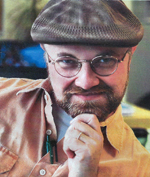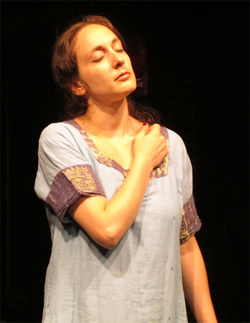)
By Eric George Tauber


SAN DIEGO — Amanda Miller, a native San Diegan turned New York actor, is coming back to her hometown with a one-woman show: One Breath, Then Another. Based on her autobiography, it chronicles her relationship with her father, her struggles with an eating disorder and her journey to India for intensive yoga training. The show officially premiered as part of Theater For The New City’s 4th annual Dream Up Festival 2013 and has also been performed at the Manhattan Repertory Theatre. An interactive yoga-workshop/performance, it will take place at the Center for Healing Arts in the Pacific Beach area.
To properly understand Amanda, you should know where she comes from. Her grandmother, Blanche, was a chorus girl on Broadway. Her mother, Terry Miller, was the drama teacher at Pershing Middle School for many years. Terry is famous for her “theatrical” seders at Passover, complete with pesadich parodies of show tunes. I shall never forget the night that Blanche belted out, “There’s no seder like our seder….”
So drama was not just an after-school hobby. Theatricality infused Amanda’s life, including her Yiddishkeit. So it’s no wonder that her literary chronicle would become a work of performance art. I recently interviewed her in advance of her show.
EGT: I know that much of your book is about your relationship with your father, David –of blessèd memory. You mentioned that he had some self-destructive tendencies. What kind of tendencies are you talking about?
AM: Well, he was prone to depression and anxiety. He developed a heart condition from overeating for most of his life. And he smoked cigarettes for a few decades, and so he really damaged his health. His smoking is what gave him lung cancer, which is what ultimately took his life.
EGT: So he was an over-eater, but then you said that he nearly starved himself to death.
AM: Yeah, that was at one point when his cardiologist told him that he needed to lose weight. So he reacted in this extreme way by just eating lettuce and crackers, and then diet pills and coffee … and cigarettes. That was his response to his doctor telling him to lose weight. I was nine at the time.
EGT: Oh wow. That’s a scary thing to watch when you’re nine. And then you had your own issues with food. I remember your being quite thin as a teenager. So when were you struggling with anorexia and how did you manage to pull out of that?
AM: I was about thirteen when I started struggling with food and then about fourteen when I just wasn’t eating. In ninth grade, I starved myself for six months before I got any kind of treatment. I started seeing a therapist and a group therapist. But what really made me come out of it was my summer camp that I loved. I had been going to Camp Ramah for years, and it was my last summer. After the first week, I had to go to the hospital and couldn’t participate in the 8-week program.
At the time, my friend had made me this tape with messages from my friends about how much they loved me. Before that, I had felt really worthless and sad. I think my anorexia was an attempt to get attention and see if anyone cared. I think that realizing that they cared so much and that I had lost this opportunity to be with them made me decide to get better.
EGT: As you say this, I’m thinking about how big food is in Jewish culture. “Oy, maidlach, eat something!”
AM: Oh, yeah.
EGT: You later had a nervous breakdown. I remember when we met up in New York, you were in college and you had these amazing opportunities to train in these competitive programs. Did it just get to be too much? Those were all very high-pressure things. Once you win the opportunity, you have to show that you deserved it.
AM: It was a little too much. You think, “If only I could get this opportunity….” It’s so exciting to get it, and it’s wonderful, but then it’s also really challenging. …
I was a year early to graduate, and I wasn’t ready for “the world”. I wasn’t sure how to be an actor in “the world”.
EGT: There’s a huge difference. I really think they should have more classes on show “business.” I do see it going more in that direction. But ivory tower academia moves slowly. These people think of themselves as liberal, but they can be very resistant to change, especially as it relates to the real world.
AM: That’s my biggest gripe with my training. I didn’t know how to bridge it with reality.
EGT: You also mentioned that part of your breakdown had to do with “obsession with language.” Can you describe what would go through your head?
AM: I started a graduate MFA in Writing program. That was really intense. … I started questioning language and wondering how it was possible to communicate using sounds and the mechanics of having it go through your brain and out of your mouth to someone else’s consciousness. How it really meant anything. I would feel that my “self” and my “speaking voice” were separate. This made it very challenging to speak to people because I would think about this when I was speaking to them.
EGT: That would get distracting. … On your website, you said that this performance was heavily influenced by an improv troupe that you worked with wherein you would pull a member from the audience and improvise a show about them. Could you talk about that?
AM: It was called, “Playing with reality.” No one was ever forced to do it. We’d get a volunteer from the audience and improvise a narrative with them, crafting a whole story in which they were the protagonist.
EGT: So, this show is also about going to India to study yoga. Did you really have to go all the way to India? We have schools for yoga here.
AM: That was a very intuitive decision, not a long deliberated thing. I had done yoga on-and-off for years. I found that it was doing something for me mentally and spiritually that nothing else was. And so I just became really interested in it and wanting to go to the place of its origin. They have training in the U.S., but this was so unique because it’s living on an ashram in rural India for a month completely immersed in a yogic lifestyle.
EGT: So explain a “yogic lifestyle”.
AM: Living very simply. It made me realize how many creature comforts we have that are not essential. We slept on very thin mattresses on concrete floors. There was no AC or heat. We sat on the ground when we ate, only vegetarian food. We didn’t speak while we ate. We were to be mindfully absorbing our food. It was hyper mindful living in a very simple way. Not being connected to electronics, not buying and selling, meditating at 5:45 in the morning, doing four hours of physical yoga. It’s its own system of ethical and peaceful-mindful living. Does that give you a better idea?
EGT: That helps a lot. I watched your promo on Youtube, and I love your description of Purnima, your yoga teacher, as “not ‘crazy’, just really enthusiastic.”
AM: It’s true. She was. She was so excited about yoga, about meditating and chanting with you at 5:45 in the morning.
EGT: Actors are not morning people, by nature. When I was on the road, my first question was always, “Where’s the coffee?”
AM: And there is no coffee there. You’re not allowed to have any stimulants or alcohol. That was hard, because I am a coffee-drinker. And we’re getting up before the sun to chant in Sanskrit. So… yeah.
EGT: Were there any moments, especially when you were lying on a thin mattress on a concrete floor and thinking, “What the hell am I doing here?!”
AM: Oh yeah. The first chunk of the show is my dealing with that question and feeling very confused.
EGT: Is there anything I haven’t asked you about that you think we should know?
AM: We haven’t talked about the interactivity of the show. The improv work inspired me to make it interactive. As Purnima, I engage the audience as trainees in the ashram, getting them to chant, do some movements and breathing exercises. At the end, I take over the interaction, which is symbolic.
EGT: The audience in the video did seem totally with you. Sometimes, in an unfamiliar environment, people get the giggles. But this audience was totally on board.
AM: It’s always a question mark with a new audience, but it has always worked out really well.
EGT: Thank you, Amanda. I am so looking forward to this.
For a young woman of 26, Amanda Miller has been on quite a journey, through anorexia, losing her father, a promising career, a nervous breakdown and an ashram. If this has piqued your curiosity, check out One Breath, Then Another at the Center for Healing Arts in PB, 1001 Garnet Ave Ste 200 on Saturday, April 19th at 8 p.m. The show runs 60 minutes for a $10 suggested donation at the door.
*
Eric George Tauber is a freelance writer specializing in the arts. He may be contacted via eric.tauber@sdjewishworld.com
*
San Diego Jewish World seeks sponsorships to be placed, as this notice is, just below articles that appear on our site. This is an ideal opportunity for your corporate message or to personally remember a loved one’s contributions to our community. To inquire, call editor Donald H. Harrison at (619) 265-0808 or contact him via donald.harrison@sdjewishworld.com